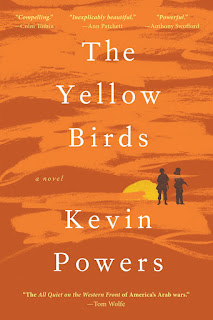On a Journey to the Heart of a Reader
Despite the fact that the story of The Yellow Birds is the work of fiction, there exist personal life experience of the author, Kevin Power, all over the story. For instance, the story, for the most part, happens in Richmond, Virginia, where Power was born and raised; on the other hand, all the Iraq scenes are happening in Tal Afar, where he spent one year “as a machine-gunner assigned to an engineer unit” (Front Row). Although it is easy to identify some of the Power’s real-life locations, it will neither prove the legitimacy of the story nor otherwise. A work of fiction needs more than the real-life experience of its author to become a legitimate work.
There are many examples of the books written by authors, who [somehow] have had a direct connection to the story or to the location or some of the events. Michael Bassey Johnson, a Nigerian author and philosopher, believes that “There are certain truths that occur to us, which we cannot convey in words, but requires a personal experience to grasp more vividly” (Bassey).
From one aspect, what Bassey Johnson says carries a weight of truth; some portions of The Yellow Birds could not exist if Power had not experienced them himself. For example, when power describes the bleeding boy and the beggar in Chapter 10, “When they last saw him, the bleeding boy approached the beggar, who in his sackcloth still crouched down warily, gathering his pastiche of discarded melon rinds and bread crusts” (Power 134). There are certain details about the story’s atmosphere, which power has drawn [here], and they cannot be achieved by research, at least not in a traditional way, or be found in any book about Iraq, unless the author has seen how is a beggar’s custom in Iraq, or what he may carry. Although this kind of detail orientation helps a story to move forward, or in Powers case shapes the atmosphere of the story, but still does not prove that a direct experience makes a story sufficient or lack of it will turn the story to an insufficient and unreliable one.
The best example, of the two different categories, are the current book, the Yellow Birds, and Billy Lynn’s Long Halftime Walk by Ben Fountain. The first book has the name of an experienced (war zone experience) writer on it while the second one carries the lack of personal [war] experience, and particularly in the matter of the war and its impacts on human lives, which is what Fountain discusses in his book. Nothing can prove that which one of the two books is more reliable than the other one but the authors’ effort on the content management, dedication and personification of the war, which its ominous shadow flies all over the lives of the two main characters of the two works of fiction. The audience feels the miserableness of the life of Billy Lynn and guilt, confusion and ridiculousness of John Bartle’s life. Both writers do not leave any doubt for their readers about the accuracy and legitimacy of their work by two very different approaches. Power transmutes himself to his character/characters, develops the feelings that he has experienced while in the war and creates a new world that has the combination of the real experience and an imagination with a slight flavor of [carefully designed] real emotion. He grabs his audiences’ heart takes them on a journey, which is painful and gainful at the same time. The contrast of a poetic romanticized atmosphere with the brutality and aggressiveness of the war makes the experience for readers unique; and the audience can assume that it might be the same experience that 17-year-old Kevin Power has had, during his presence in Iraq and even after that. “Mere outlines took shape, and the city vague and national at night, become contoured and substantial thing before us” (Power 16).
On the other side, Fountain spent a long time doing researches, to find every [single] possible detail about the war and its effects on young soldiers. He has read and seen many cases to establish characters that are easy to believe. Although his method seems more logical and scientific than Power’s, but both outcomes seat in the same row to attract almost the same range of the audiences.
Personal experience, for an author, can play a significant role on a work of fiction or can turn to a dangerous bomb on his hand that destroys the entire work. It is not a necessary tool, but it can turn to a useful one if combined with creativity freshness and intelligence. The success in The Yellow Birds comes from Power’s creativity and his perspective on designing details, which have colored the story. Of course, he has used his personal experience, but it has worked and it has melted to the rest of the imaginary creative slice, and it is too hard to divide the two portions while reading the book.
Work Cited
Bassey Johnson. "Michael Bassey Johnson." Goodreads. Google. Web. 14 Nov. 2015.
Front Row. BBC Radio 4. London, 7 Sept. 2012. Radio.
Fountain, Ben. Billy Lynn's Long Halftime Walk. New York: Ecco, 2012. Print.
Powers, Kevin. The Yellow Birds: A Novel. New York: Little, Brown, 2012. Print.



Comments